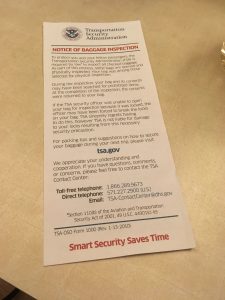 The Fourth Amendment to the United States Constitution it reads “The right of the people to be secure in their persons, houses, papers, and effects, against unreasonable searches and seizures, shall not be violated, and no Warrants shall issue, but upon probable cause, supported by Oath or affirmation, and particularly describing the place to be searched, and the persons or things to be seized.”
The Fourth Amendment to the United States Constitution it reads “The right of the people to be secure in their persons, houses, papers, and effects, against unreasonable searches and seizures, shall not be violated, and no Warrants shall issue, but upon probable cause, supported by Oath or affirmation, and particularly describing the place to be searched, and the persons or things to be seized.”
Yet, the federal Transportation Security Administration opens locked luggage, even if they have to break the lock and they do it with impunity. If they checked your bag, they’ll be little card in your luggage that says they were there rummaging through your belongings. Yet, it’s perfectly legal even though it seems like it goes against the spirit if not the letter of the 4th Amendment.
In 1973 the 9th Circuit Court rules on U.S. vs Davis, 482 F.2d 893, 908, there are key pieces of wording that give the TSA its power to search essentially any way they choose to. The key wording in this ruling includes “noting that airport screenings are considered to be administrative searches because they are conducted as part of a general regulatory scheme, where the essential administrative purpose is to prevent the carrying of weapons or explosives aboard aircraft.”
U.S. vs Davis goes onto to state “[an administrative search is allowed if] no more intrusive or intensive than necessary, in light of current technology, to detect weapons or explosives, confined in good faith to that purpose, and passengers may avoid the search by electing not to fly.”
U.S. vs Davis was upheld by the 9th Circuit Court in 1986 in U.S. vs Pulido-Baquerizo, 800 F.2d 899, 901 with this ruling “To judge reasonableness, it is necessary to balance the right to be free of intrusion with society’s interest in safe air travel.”
These 9th Circuit Court ruling laid the path for the creation of Public Law 107-71, the Aviation Transportation and Security Act, which was virtually unopposed by legislators when it was it was signed into law on the 19th of November 2001 by President George W. Bush. This law laid the groundwork for the Transportation Security Administration and the evolution of its current security procedures.
These laws give the Department of Homeland Security (DHS) and Transportation Security Administration significant legal latitude to perform the searches utilizing their current procedures without fear of violating the Fourth Amendment. Any attempt to oppose TSA searches citing the Fourth Amendment would be rebuffed unless done through the proper legal channels.
Benjamin Franklin once wrote, “Those who would give up essential liberty, to purchase a little temporary safety, deserve neither liberty nor safety.” Seems appropriate to this issue.
